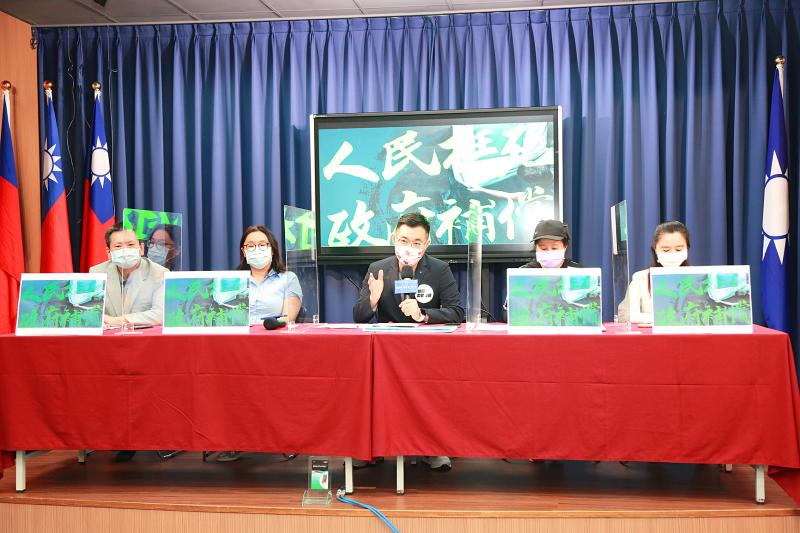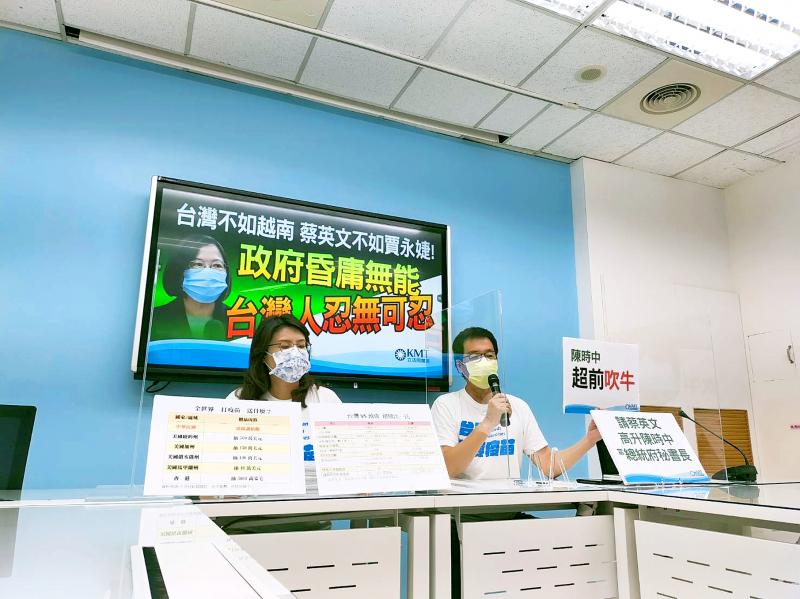The Chinese Nationalist Party (KMT) legislative caucus yesterday proposed an alternative set of COVID-19 response measures, centered around importing 30 million vaccines by the end of August and offering compensation for lives lost.
By the end of this month, polymerase chain reaction (PCR) testing capacity should reach 100,000 per day, while anyone should be able to take a rapid test free of charge, KMT caucus whip Alex Fai (費鴻泰) and caucus secretary-?general Cheng Li-wun (鄭麗文) told an online news conference held at the Legislative Yuan.
This should be followed by the importation of at least 30 million internationally recognized vaccines by the end of August, distributed according to an adjusted priority list, they said.

Photo courtesy of the Chinese Nationalist Party
As for local vaccines, records of the emergency use authorization process should be made public and their price reviewed, they said.
International recognition must also be obtained for any domestic vaccines, they added.
To ease people’s financial burden, the caucus also proposes giving each citizen NT$10,000 (US$362) in cash, suspending electricity price hikes and reducing income taxes, they said, adding that compensation should be offered for lives lost due to COVID-19.

Photo courtesy of the Chinese Nationalist Party
Calling Taiwan “worse than Vietnam” and President Tsai Ing-wen (蔡英文) “worse than Jia Yong-jie (賈永婕),” an entertainer who recently helped purchase hundreds of high-flow nasal cannula machines, Fai said that Jia’s donations and Vietnam’s success have laid bare the government’s supposed “advance planning.”
Vietnam, like Taiwan, saw an outbreak begin in the past two months and has been slow in obtaining vaccines, Cheng said.
Yet Vietnam has fewer cases, even with 98 million people, and a fatality rate of 0.6 percent, a fraction of Taiwan’s 3.5 percent, she said.
This is despite Taiwan having a GDP eight times the size of Vietnam’s and a far better-equipped medical system, she added.
Vietnam is also far ahead in vaccine procurement, having received 5.8 million doses to Taiwan’s 2.11 million, in addition to discussing the right to manufacture US mRNA vaccines, she said, adding that by contrast, Taiwan has not been buying vaccines or negotiating manufacturing rights, preferring instead to wait for a domestic option.
Cheng accused the Food and Drug Administration of cooperating with Medigen Vaccine Biologics to approve its vaccine, adding that it is to be sold at the highest international price, even without having international approval.
“If the government wants to give money to Medigen, that is one thing, but it cannot force Taiwanese to have only domestic vaccines to choose from,” she added.
Separately in an online news conference held at KMT headquarters in Taipei, KMT Chairman Johnny Chiang (江啟臣) said that the 452 Taiwanese lives lost to the virus as of the time of the news conference were “not a cold statistic.”
Of the 440 deaths recorded since last month, 274, or about 62 percent, either occurred within one week of diagnosis of COVID-19 or were people who were confirmed to have COVID-19 after death, he said.
“What do these 400-plus lives mean to the government?” Chiang asked, as he accused the government of failing its responsibility to take care of the public and letting people “live in fear and anxiety.”
The KMT caucus is to propose providing NT$300,000 in “consolation money” and NT$2.5 million in compensation for each death from COVID-19, he said.
People confirmed to have the disease should receive NT$50,000 in “consolation money” and NT$100,000 in compensation from the government, he added.
The KMT would support former minister of health and welfare Yaung Chih-liang’s (楊志良) efforts to help family members of those who have died from COVID-19 seek further state compensation, Chiang said.
The caucus proposes that the government offer compensation and “consolation money” on the grounds that the deaths from COVID-19 have been significant, were not due to people’s actions and could be attributed to the government’s policy decisions, KMT Legislator Lin Wei-chou (林為洲) said.

Eight restaurants in Taiwan yesterday secured a one-star rating from the Michelin Guide Taiwan for the first time, while three one-star restaurants from last year’s edition were promoted to two stars. Forty-three restaurants were awarded one star this year, including 34 in Taipei, five in Taichung and four in Kaohsiung. Hosu (好嶼), Chuan Ya (川雅), Sushi Kajin (鮨嘉仁), aMaze (心宴), La Vie by Thomas Buhner, Yuan Yi (元一) and Frassi in Taipei and Front House (方蒔) in Kaohsiung received a one-star rating for the first time. Hosu is known for innovative Taiwanese dishes, while Chuan Ya serves Sichuan cuisine and aMaze specializes

STATS: Taiwan’s average life expectancy of 80.77 years was lower than that of Japan, Singapore and South Korea, but higher than in China, Malaysia and Indonesia Taiwan’s average life expectancy last year increased to 80.77 years, but was still not back to its pre-COVID-19 pandemic peak of 81.32 years in 2020, the Ministry of the Interior said yesterday. The average life expectancy last year increased the 0.54 years from 2023, the ministry said in a statement. For men and women, the average life expectancy last year was 77.42 years and 84.30 years respectively, up 0.48 years and 0.56 years from the previous year. Taiwan’s average life expectancy peaked at 81.32 years in 2020, as the nation was relatively unaffected by the pandemic that year. The metric

Taitung County is to launch charter flights to Malaysia at the end of this year, after setting up flights to Vietnam and Thailand, the Taitung County Government said yesterday. The new charter flight services, provided by low-cost carrier Batik Air Malaysia, would be part of five-day tour packages for visits to Taitung County or Malaysia. The Batik Air charter flight, with about 200 seats, would take Malaysian tourists to Taitung on Dec. 30 and then at 12:35pm return to Kuala Lumpur with Taiwanese tourists. Another charter flight would bring the Taiwanese home on Jan. 3 next year, arriving at 5:30pm, before taking the

Taiwan High Speed Rail Corp. (THSRC) plans to ease strained capacity during peak hours by introducing new fare rules restricting passengers traveling without reserved seats in 2026, company Chairman Shih Che (史哲) said Wednesday. THSRC needs to tackle its capacity issue because there have been several occasions where passengers holding tickets with reserved seats did not make it onto their train in stations packed with individuals traveling without a reserved seat, Shih told reporters in a joint interview in Taipei. Non-reserved seats allow travelers maximum flexibility, but it has led to issues relating to quality of service and safety concerns, especially during